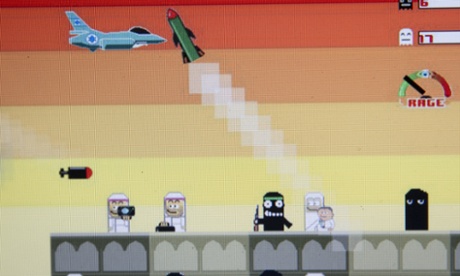
Are some topics just too taboo to be tackled by gaming?
This week, a controversial game called “Bomb Gaza” was pulled from the Google Play store after a public backlash. Designed for Androids and tablets, the game’s stated aim was to “drop bombs and avoid killing civilans”.
Inevitably, the game drew a slew of negative reviews and negative commentary before it was eventually taken down by Google, who said it violated their policies.
As of yet, the creator of the game hasn’t responded to requests, including from the Guardian, for comment – though its creator has made the game available on the developers’ Facebook page.
And this isn’t the only Gaza game which has cropped up while the crisis has escalated in recent weeks.
Gaza Assault: Code Red is another app which was removed from Google Play this week. Another, Iron Dome: The Game remains available to download at the time of writing.
Whether or not games can effectively tackle complex issues is, by now, a moot point. Plenty of games have tried and succeeded. There have been games about September 11 , games dealing with the effects of depression and games about other warzones, including Syria. Classed as newsgames, more and more developers are creating games which help the players to understand and empathise with situations covered by the media.
But when it comes to the ongoing conflict in Gaza, is it possible to create a game based on an incredibly volatile situation without seeming to belittle the thousands of people who have died?
None of the developers of the aforementioned games have classed their games as newsgames, instead placing them with the escapism associated with gaming in general. In an interview with Sky News, the creator of Gaza Assault, Nir Yomotov, said:
“It’s nothing sinister, you shoot people who shoot you. It’s like every other game. I don’t want to offend anyone.
“Games are just another medium, like video. You can use it to make your voice heard.”
Tomas Rawlings of Auroch Digital and GametheNews says there’s a difference between a topical game and a news game, with one being current and the other attempting to engage the user with a topic and convey information.
He said: “[People ask] is this the right medium for this kind of topic?
“People aren’t used to games being used to discuss serious topics – they’re seen as something fun. But for the generations who grew up gaming, it’s natural for them to express how they feel about the work in the form of a game much as a singer would write a song and a filmmaker point their camera.
“There is nothing intrinsic in the form that means a subject can’t be covered by a game, it’s not the form you use but what you say that matters. There are plenty of examples of films, cartoons, books and poems that have triggered huge offence, even violence.
“I think Israel/Palestine is a great example of where, if you’re going to make a game, you need more than one outcome. Traditionally, you win or lose a game, but this is far bigger than win or lose.”
Rawlings himself has experience on this front, having created EndGame: Syria. It too faced its own problems and was rejected by Apple due to its political content.
He added: “With a sensitive topic, the designers’ intentions should be clear. What is the game trying to say? Is it about how hard it is to bomb without hitting civilians? This is key in any medium: treat your source material with sensitivity.”
Arguably, with the same care and precision given to any other medium, it is possible to create a game about the ongoing conflict in Gaza – and it’s already been done.
Watching on mobile? Click here for video
In 2007, a team created PeaceMaker, a game in which players are challenged to “succeed as a leader where others have failed”. Where other games concentrate on the warfare, PeaceMaker rewards players for, as the title suggests, making peace.
Asi Burak, president of Games for Change, created the game over three years with game developers Eric Brown and Tim Sweeney and a group of Carnegie Mellon University students. In a guest post for gaming site Kotaku about the experience, calling it an “eye-opening” journey.
He said, generally speaking, it’s positive to see more games and interactive experiences which are responding to news and current events. “While I understand the outcry around a game that takes a one-sided approach and seems to be daft about the complexity of the situation, in my eyes it is fair game (no pun intended).
“During the recent conflict in Gaza and Israel I’ve seen numerous one-sided and insensitive notions on social media, in newspapers, in video clips which triggered debate and strong emotions. There is no reason we won’t see such content in interactive format.”
But Burak suggests there may be a problem in the way mobile publishers like Google Play and iTunes deal with these games.
“Unfortunately, the mobile publishers are not yet sophisticated and seem to make random choices around such content,” he said.
“Banning statements that they wouldn’t necessarily ban if they came in written form or in a song. I hope this will change in the near future.”
For Burak, these games can have immense value for those trying to understand both sides of the conflict. “Games have a number of attributes that makes them excellent for learning, for understanding complex systems and situations, for inviting participation and social action,” he said.
“Perhaps more importantly, games could allow you to view perspectives that are very different than your own, including the ‘other’.”

